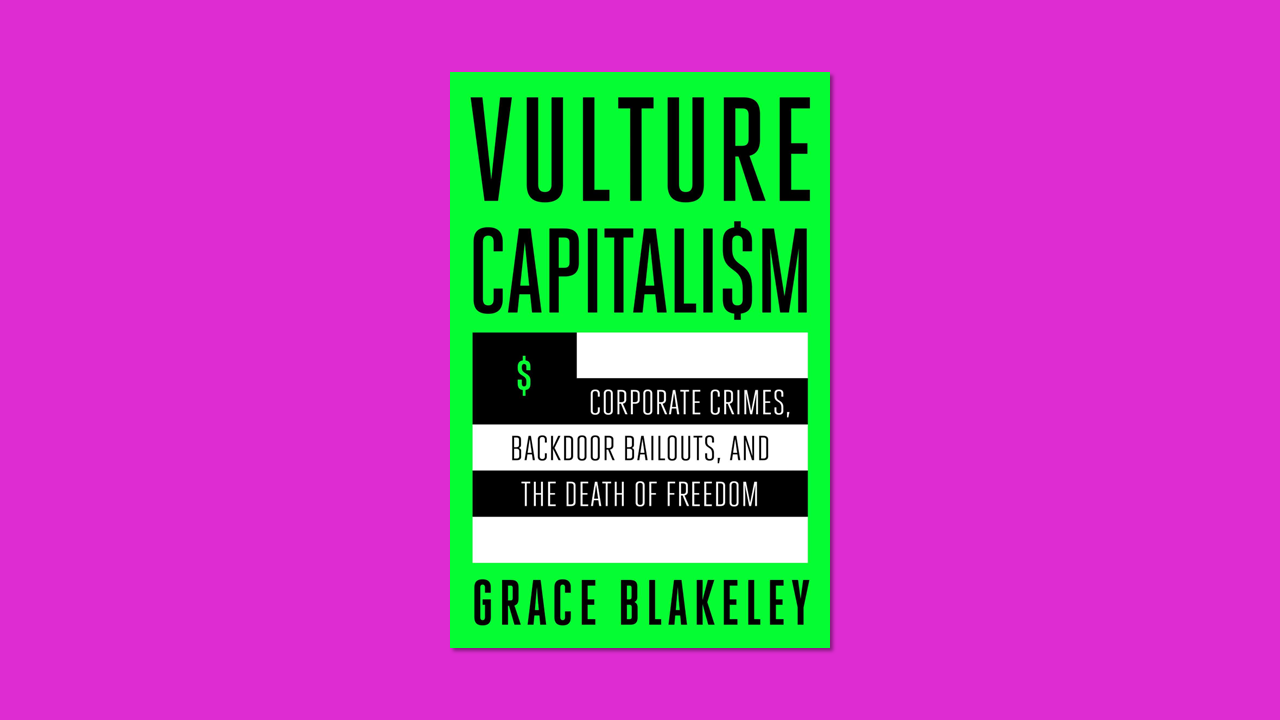Friedrich Hayek, often thought of as the father of neoliberalism, is best known for championing a resurgence of the free market, re-imagining Adam Smith’s visionary metaphor of the “invisible hand”. But true neoliberalism, argues British socialist commentator Grace Blakeley, in fact took a significant turn from its classical predecessor, trading in the egalitarian ideal of a “free market” for a more orchestrated approach.
In her new book, Vulture Capitalism: Corporate Crimes, Backdoor Bailouts and the Death of Freedom, Blakeley retraces neoliberalism’s short- and long-history, looking beyond a conventional analysis that would start with the rise of politicians like Margaret Thatcher and Ronald Reagan, and instead tracks this peculiar variant of capitalism back centuries. Her analysis begins with the cut-throat political philosophy of Thomas Hobbes and John Locke, moving to the foundational economic theorizing of Adam Smith and David Ricardo, followed by Karl Marx’s critique of capitalism. She retells the conventional reading of neoliberalism as a battle between John Maynard Keynes and Hayek over the twentieth century, with the latter coming out on top in the end.
The “free market,” Blakeley writes, has given way to “a world of pervasive private planning.” While capitalist societies are often juxtaposed to the centralized planning of state socialism, Vulture Capitalism imagines, “capitalism [as] a system defined by a tension—a dialectic—between markets and planning.”
It is a tension that has had disastrous consequences. Blakely spends the majority of her book unpacking the economic disasters of the 21st century, from the 2008 Financial Crisis which, “was driven as much by crooked coordination between powerful actors as it was by unrestrained ‘free market’ capitalism,” to the COVID-19 Pandemic, when “governments and big businesses worked together to expand control over society and augment profits at the expense of workers.” Enlisting the insights of thinkers like Isabella Weber in her critique of the pandemic-induced inflation, she demonstrates how the wealthy and powerful have continued to profit off of workers’ precarity since 2020.
While the re-framing of capitalism as requiring a “planned economy” is not a novel insight, Blakeley offers painstakingly detailed accounts of how this system emerged and evolved over the centuries. Through especially impactful anecdotes from the past twenty years, Vulture Capitalism occasionally gets bogged down in the details, with Blakeley’s arguments becoming self-reinforcing towards a somewhat pessimistic framing of the current state of global capitalism. Even with the closing “People-Powered Planning” section of the book, which provides hopeful examples of grassroots anti-capitalist successes, it is challenging not to fall back into cynicism in the fight to take back democratic control from capital’s cronies.
When considering just the electoral prospects in Western liberal democracies of this summer 2024, one can begin to see why this pessimism persists even amid triumphs.
Beginning in June, European parliamentary elections saw far-right parties accomplish major gains at the expense of the left. In this instance, disenchanted voters turned — for many reasons — to far-right parties, who promised racist and xenophobic solutions as the fix to years of status quo neoliberalism. While they will secure their power by making inroads with European centrists, the far-right is making gains in what some are calling a “greenlash” against green climate action policies that have not considered the well-being of the working-class amid economic transformation. Meanwhile, the EU-level electoral left-wing and centre-left have failed to deliver hope through a unifying class-conscious message to an electorate that is increasingly divided and captured by the right.
This was followed quickly thereafter by the United Kingdom’s snap parliamentary election on July 4, where a victorious Labour party masked their neoliberal ambitions under the guise of progressivism. Following the party’s removal of Jeremy Corbyn as leader, and culminating in their recent parliamentary victory, Keir Starmer’s labour party has left real progressives skeptical about the tangible amount of “change” they will achieve, seen moreso as a change in management than in policies. “In the UK,” Blakeley writes, “the links between the public and private sectors have become so close that it is hard to know where one ends and the other begins.” Starmer’s measured turn towards technocracy would only reinforce these links.
Seeds of optimism, however, may be found in France, where another snap election led to a victorious left-wing coalition, after a first-round surge by Marine Le Pen’s far-right alliance. Though it was not a complete, outright victory for the Jean-Luc Mélenchon-led Nouveau Front Populaire (NFP), the July 7 results elated progressives who had feared France would return to a far-right rule not seen since the Second World War. The impromptu leftist NFP coalition does demonstrate the unity dreamed of in Vulture Capitalism’s vignettes of “people-powered planning,” whose stories, “illustrate the incredible things people can achieve when they work together outside capitalist institutions,” as Blakeley writes. But as the circumstances of the United States 2024 presidential election remain unclear at the time of this writing, is there enough hope that the 99% can survive — or even flourish — in the face of a global shift to the right, or will Blakeley’s “vulture capitalists” would continue to pick at their remains?
At the heart of Vulture Capitalism lies a call for greater economic accountability. Between the nitty gritty details of crony capitalism, to waxing poetic on political philosophy, Blakeley shows how we got to our current state of neoliberal capitalism, but provides a less clear roadmap on how we might arrive at something better. Vulture Capitalism asks whether liberal democracy ever truly existed in Western countries to begin with. “Capitalist economies,” Blakeley writes, “are subjected to conscious control all the time—just not democratic conscious control” (emphasis in original).
While Blakeley succeeds in depicting the tragic culmination of neoliberalism, her revolutionary rhetoric seeks something grander. Emerging from the economic fallout of the COVID-19 pandemic, which Blakeley also writes on extensively in Tribune, the story she set out to tell was not a happy one. Within its tragedies, however, Vulture Capitalism offers glimmers of hope for real justice and equality. While it may not be the unifying manifesto that calls the left to action, Blakeley sows the seeds of discontent with thorough analysis and a rousing narrative.





